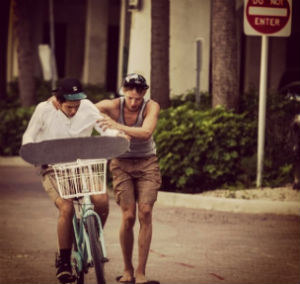Teen Killed by Cops’ Taser Made Music, Dreamed of a Skate Empire
Friend of deceased teen slain by cops keep his business ambitions alive.
Aug 13, 2013— -- A minute into my conversation with Rafael Lynch, he tipped his head back, staring into the sky. “Sometimes I think it was the stars,” he told me privately, before the rest of the crew arrived for a video shoot. Before last week’s fateful events, Lynch’s best friend, Israel Hernandez, said he’d had a vision of the stars. As Lynch stands outside his Bal Harbor home on Miami Beach, the quiet, cloudless night is an invitation to contemplate the premature death of his friend.
Just a week ago, a Miami Beach police officer caught Hernandez writing graffiti on the wall of an abandoned McDonald’s. A chase ensued, and by some accounts, five officers had surrounded Hernandez, when he was shot in the chest with a Taser. An ambulance was called. Hernandez was rushed to a local hospital, where he was later pronounced dead.
“He was probably meant to leave this world,” Lynch said of Hernandez a few minutes later, now at home. “He wasn't satisfied with this world. He didn't like it.”
He told the story of their friendship in a state of disbelief. The two shared everything together—a love of skateboarding, surfing, music and art. Lynch talked of how they would dig holes in the sand at Miami Beach, stick an umbrella into one, and sit in the shade for hours, learning to produce music on an iPad. Skateboarding up and down Collins Avenue on Miami’s North Beach, they would hitch rides from passing cars—at least 500 times, Lynch figured.
His favorite memory is of when Hernandez finally stood up on a surfboard for the first time, after he’d insisted they go surfing during a pitch-black night.
Hearing these descriptions, the two sound more like playmates in a toddler’s pen than friends in their late teens. It sounds more like fuzzy childhood memories than a thriving relationship that was real up until a week ago.
The night before Hernandez’s death, Lynch took a video of his best friend skateboarding the streets of Miami Beach. He uploaded the video to YouTube. He has watched it over and over since, he told me. Even in its raw, cellphone-taped format, Hernandez’s often-cited electric personality oozes through the recording with style and self-confidence.
This style might not win him a medal in a contest, but it is the kind that might win him praise from purists. “He taught me that perfection is in imperfection,” Lynch said.
Since he started skating with Hernandez, Lynch has learned to loosen himself up. He has gotten much more comfortable on a skateboard, and in life: “He taught me how to have fun without money. With freedom.”
Last Tuesday, when Lynch called Hernandez repeatedly, he never got an answer. At 5 p.m., he received a call from Hernandez’s sister to tell him the news. In shock, he went to their house to find a family destroyed. Fulfilling what they assumed to be their son’s wishes, the family gave Lynch their son’s skateboard. It now rests in Lynch’s living room, next to his own.
These skateboards were the long-term goal of their relationship, Lynch explains. They weren't just friends, they were partners: One of their many shared ambitions was to build a new skateboard line. The boards are cut into unorthodox shapes, and unlike most skating companies’ products, the duo placed little emphasis on the graphics.
Now without his partner, Lynch vows to fulfill the goal of launching the ‘Tropical Skateboards” line that that they created together. Hanging on the wall behind him is the first finished board he created after the incident. “He would flip if he saw it,” he says of Hernandez.
Lynch is not alone: Plenty of others have rallied to keep Hernandez’s work, his vision, and his spirit alive. Artists from as far as Australia have painted colorful murals using his tag “Reefa,” showcasing them online in solidarity and remembrance. There is a building mountain of objects in his memory at a corner in Miami Beach, in front of the solitary “R” that he managed to write, before he was chased and killed by police.
In my Miami neighborhood, close to the Wynwood Art District, countless “Reefa” tags and his now-iconic flower have been going up for the past week. While I can verify that a few were there before his death, the number is on the rise, and I spot new additions daily.
Only time will tell how we judge Hernandez’s demise. His family and attorneys called for an independent investigation into the circumstances surrounding the death, which the Florida Department of Law Enforcement will be conducting. Friends and fellow artists hold on to colorful memories, his artful spirit, and the constant whistling that was his trademark.
Back at his house, Lynch talked about the music that they made together. He cruised his iPad, looking for a good sample of music that Hernandez composed. A few of the songs have slowed-down vocal samples from Hernandez, saying things like “chupacabra” and “la playa esta caliente.”
Lynch paused on a vocal sample and isolated the voice, listening to his best friend over and over on a loop. He didn't look up for a minute.
As we walked out of the house, the news crew made small talk with his mom. “Us mothers,” she said. “We have to be on top of our sons.”
